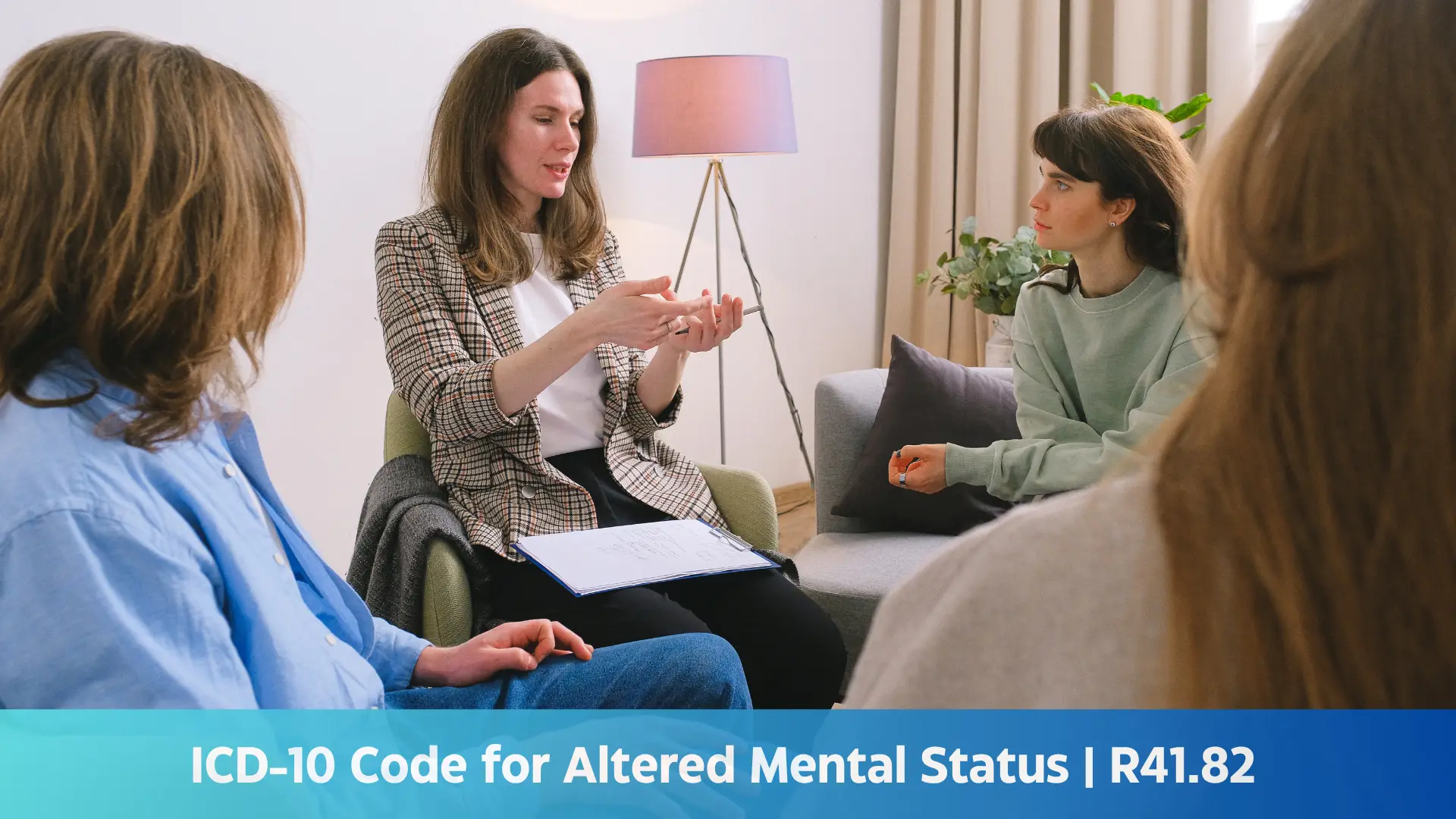Introduction to ICD 10 Code for Altered Mental Status (R41.82)
According to National Library of Medicine (NLM), approximately 5% of emergency department patients present with altered mental status (AMS), making it one of the most frequent and diagnostically complex presentations in acute care. AMS may reflect a wide range of underlying conditions like neurological, metabolic, infectious, or toxic that require rapid evaluation and precise clinical documentation to ensure proper diagnosis and coding.
In ICD-10-CM, the appropriate code for unspecified altered mental status is R41.82, classified as a symptom code. The ICD 10 Code for altered mental status (R41.82) should only be used when no definitive diagnosis has been established. Improper use can lead to payer denials, DRG misclassification, or compliance audits.
What You’ll Learn
In this guide to the ICD 10 Code for altered mental status (R41.82), you’ll learn how to:
- Correctly apply R41.82 for altered mental status when no definitive diagnosis is established
- Differentiate AMS from related conditions such as delirium, confusion, disorientation, and encephalopathy
- Avoid common coding errors that lead to claim denials or DRG misclassification
- Understand the clinical documentation requirements to support medical necessity
- Navigate confusion coding guidelines and avoid redundant or unsupported code assignments
- Improve compliance with payer-specific expectations for symptom-based coding in 2025
What Is Altered Mental Status (AMS)?
Altered Mental Status (AMS) is a broad and non-specific term used to describe abnormal changes in a patient’s cognitive function, awareness, behavior, or consciousness. AMS may present as:
- Disorientation to time, place, or person
- Confusion or mental fog
- Unresponsiveness or lethargy
- Inappropriate verbal or motor behavior
- Agitation or uncooperativeness
AMS is not a standalone diagnosis, it is a clinical manifestation that can be caused by various underlying medical, neurological, psychiatric, or metabolic conditions. Therefore, its proper documentation and coding are critical to ensure that claims accurately reflect the medical necessity and clinical picture.
ICD 10 Code for Altered Mental Status (AMS)
The official ICD-10-CM code for altered mental status is:
R41.82 — Altered Mental Status, Unspecified
Code Classification:
- Chapter: XVIII – Symptoms, signs and abnormal clinical and laboratory findings (R00–R99)
- Section: R40–R46 – Symptoms and signs involving cognition, perception, emotional state, and behavior
- Billable: Yes (Final-level diagnosis code)
- Effective for FY 2025: Valid for services from October 1, 2024 onward
This code is used when a patient presents with altered mental status and no definitive diagnosis has been made at the time of evaluation or admission.
Note: R41.82 is considered a symptom code, not an etiology code. It should only be used when no more specific or confirmed diagnosis is available at the time of coding.
Clinical Use Cases for ICD 10 Code for Altered Mental Status (R41.82)
Use ICD 10 Code for altered mental status (R41.82) when:
- AMS is the primary presenting symptom during an ED or inpatient encounter
- Workup is ongoing and no underlying diagnosis has been confirmed
- AMS occurs in isolation or precedes a confirmed diagnosis
- Providers clearly document “altered mental status” as a working clinical impression
Avoid using R41.82 when:
- AMS is secondary to a documented condition such as delirium, stroke, encephalopathy, sepsis, trauma, or drug overdose
- The patient's cognitive status is explained by a chronic neurodegenerative disease like dementia or Parkinson’s disease
Symptom codes like R41.82 should never be used as a principal diagnosis if a more definitive condition is identified and documented.
Common Conditions That May Present as AMS
| Condition | ICD-10 Code | When to Use |
|---|---|---|
| Altered Mental Status (unspecified) | R41.82 | No known cause yet; under evaluation |
| Confusion | R41.0 | Documented confusion with no other symptom |
| Disorientation | R41.3 | Loss of awareness to time/place/person |
| Acute Delirium | F05 | Transient disturbance of attention and cognition |
| Hepatic Encephalopathy | K72.91, G93.41 | AMS secondary to liver failure/metabolic dysfunction |
| Toxic-Metabolic Encephalopathy | G93.41 | AMS due to drugs, sepsis, or metabolic derangement |
| Dementia with Behavioral Disturbance | F03.91 | Confirmed cognitive impairment with AMS-like features |
Documentation Guidelines for ICD 10 Code for Altered Mental Status (R41.82)
To correctly support the use of ICD 10 Code for altered mental status (R41.82), providers must thoroughly document the cognitive symptoms and the diagnostic reasoning. Payers and auditors frequently request additional chart documentation for symptom-based codes like R41.82.
Key Elements That Must Be Documented:
- Detailed Description of Cognitive Impairment
- Clearly define the observed mental status change (e.g., "patient confused and disoriented to place and time").
- Include patient’s baseline if known.
2. Onset and Progression
- Was the AMS acute or gradual?
- Did it occur suddenly or over several days?
3. Relevant Diagnostics Ordered
- CT/MRI brain imaging, EEG, urinalysis, CBC, blood glucose, toxicology, etc.
- These support medical necessity for evaluation.
4. Differential Diagnosis
- Ensure other potential causes (e.g., stroke, encephalopathy, sepsis, trauma) are considered and either ruled in or out.
5. Ongoing Assessment
Document improvement, worsening, or persistence during the episode of care.
Note: If ICD 10 Code for altered mental status (R41.82) is used, payers may request additional records. Ensure encounter notes justify diagnostic workup and include a reassessment plan.
Confusion Coding Rules: Avoiding Overlap
Confusion, disorientation, and altered mental status often coexist, but should not be coded redundantly unless clinically distinct and documented separately.
| Symptom/Condition | Code | Can You Use with R41.82? |
|---|---|---|
| Confusion | R41.0 | No, unless distinct and separately documented |
| Disorientation | R41.3 | No, unless separate from AMS |
| AMS (unspecified) | R41.82 | Only if no more specific cause is identified |
| Delirium | F05 | Use instead of R41.82 if diagnosed |
Expert Support for Complex AMS Coding
Pro-MBS brings deep specialization in ICD-10 coding for complex neurological and cognitive presentations, including altered mental status (R41.82). Our certified medical coders work directly with providers to ensure precise code selection, proper linkage between symptoms and diagnostic workups, and full alignment with payer-specific documentation protocols.
By leveraging our expertise, healthcare practices can reduce coding-related denials, minimize DRG mismatches, and improve reimbursement accuracy especially when dealing with undifferentiated conditions like AMS in high-acuity settings.



